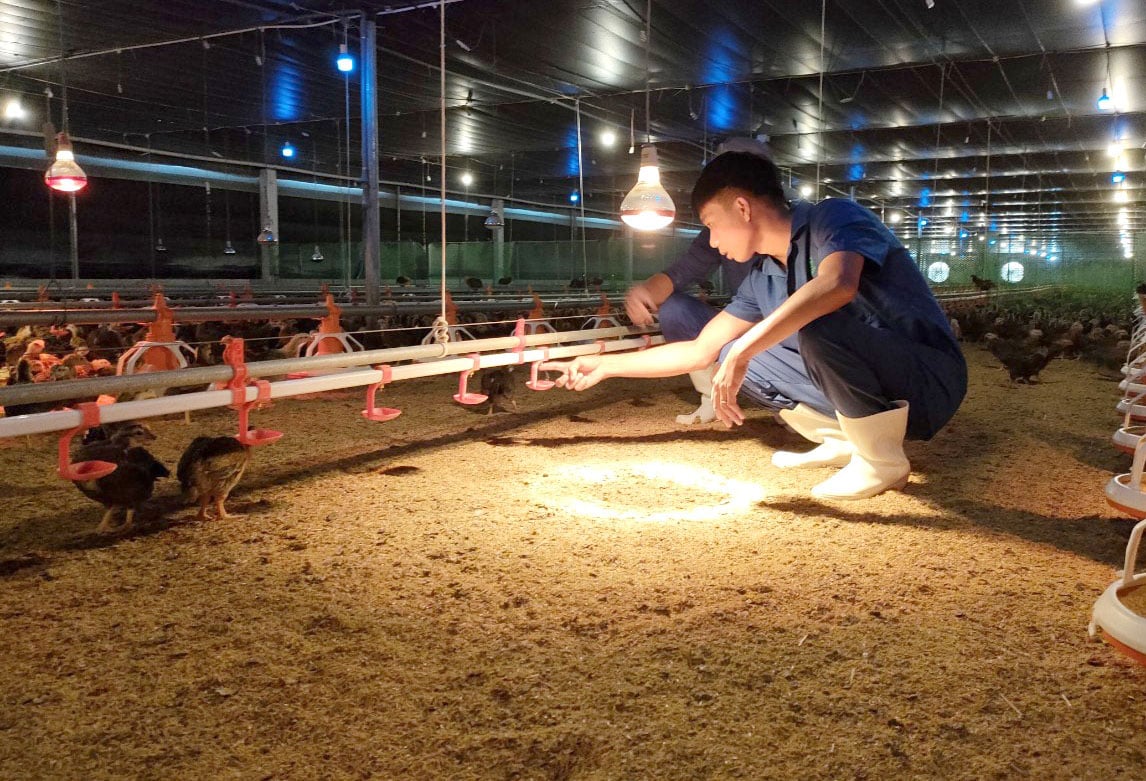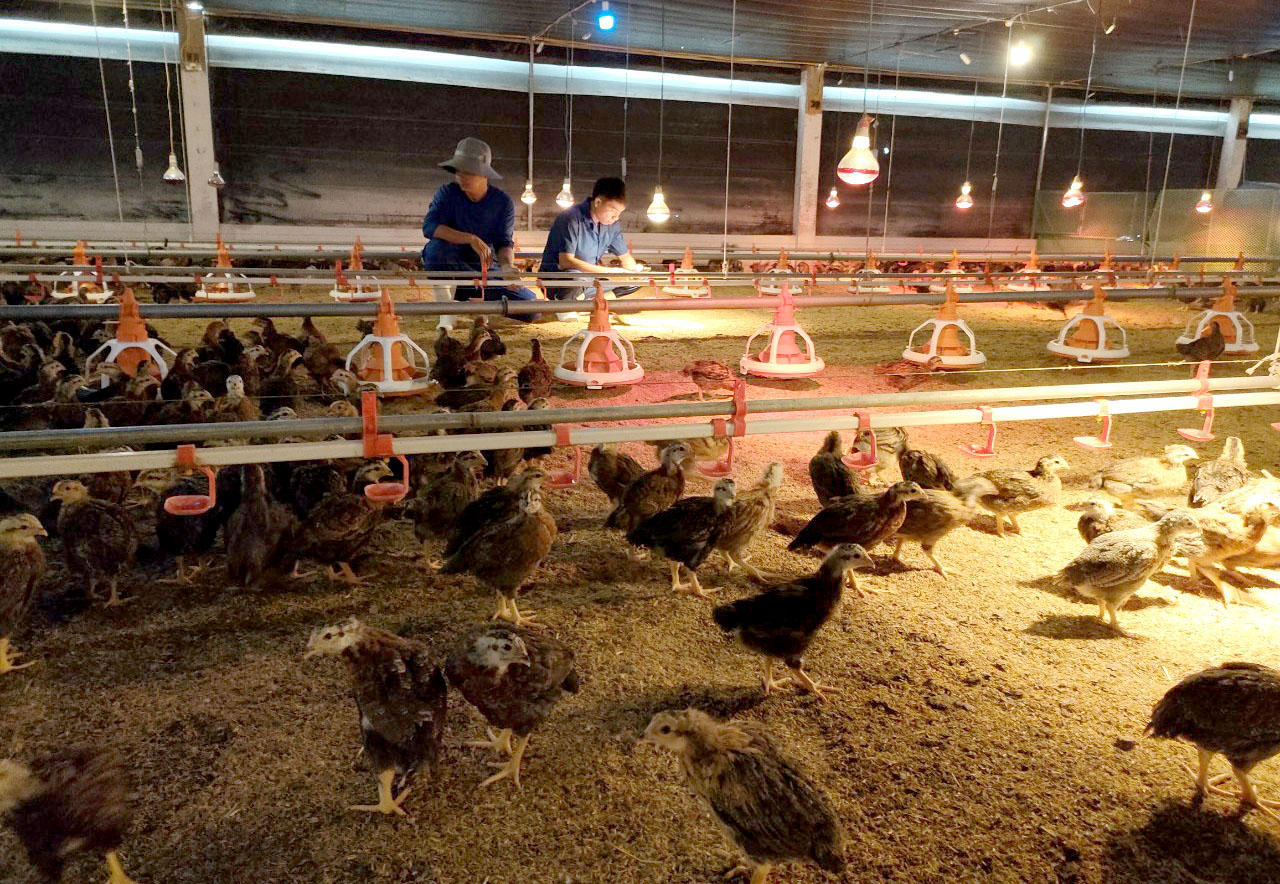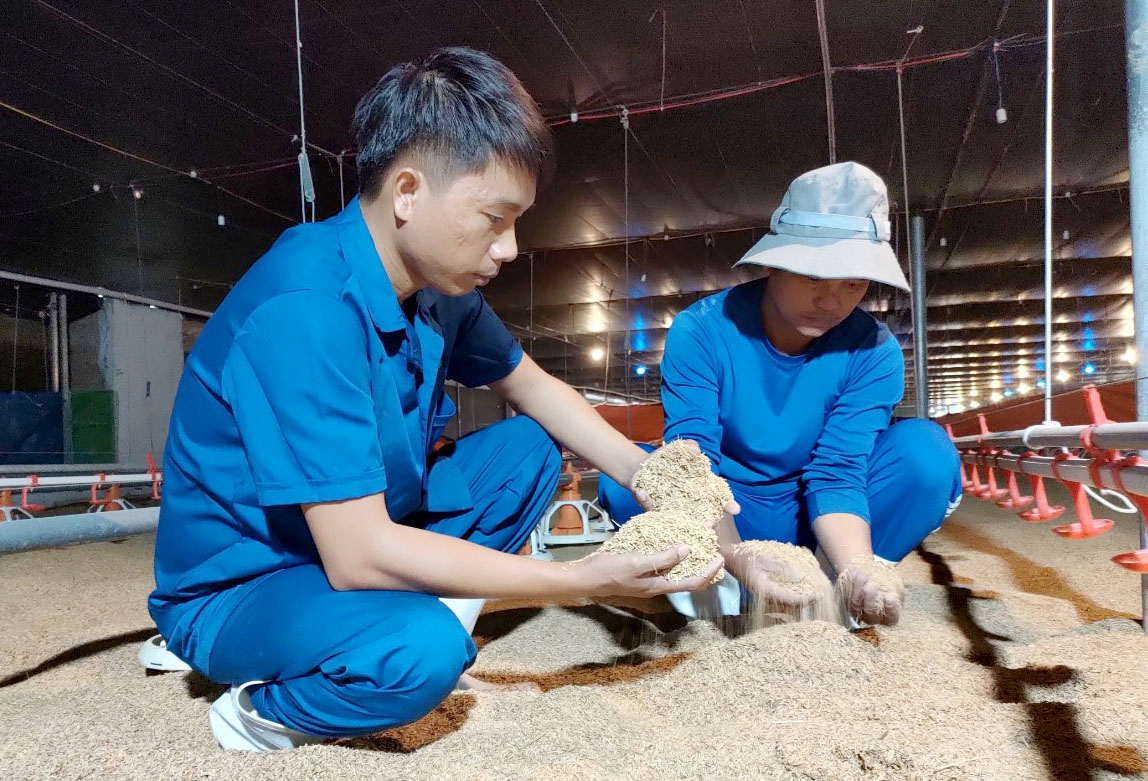June 1, 2025 | 06:20 GMT +7
June 1, 2025 | 06:20 GMT +7
Hotline: 0913.378.918
June 1, 2025 | 06:20 GMT +7
Hotline: 0913.378.918

Mr. Nguyen Van Vuong's family has established a partnership with C.P. Vietnam Corporation to develop a commercial poultry farming model. Photo: Minh Hau.
Mr. Nguyen Van Vuong's family partnered with C.P. Vietnam Corporation in 2020 to establish a poultry farm spanning thousands of square meters in Thon 5, Gia Lam commune, Lam Ha district, Lam Dong province.
Accordingly, Mr. Vuong's family rigorously implemented a strict farming process which adheres to all regulations for disease prevention and control, in order to ensure the safety of the poultry from diseases.
Mr. Vuong designed multiple zones within the farm to serve various functions. He explained, "Diseases often have complex developments. Without effective preventative measures in place, the cost can be extremely high. As a result, we must maintain strict control."
According to Mr. Vuong, all of the farm's workers, engineers, and animal health staffs are subject to a thorough cleaning and multiple disinfection processes before entering the premises in order to prevent diseases from entering the farm. Similarly, the staffs must also follow these procedures when leaving in order to prevent the potential spread of diseases outside the farm.
Vehicles and equipment entering the farm are also required to undergo disinfection and drive through lime pits. A engineer stationed at the farm stated, "Vehicles carrying animal feed into the farm must be disinfected by driving through lime pits. Additionally, the feed must be transferred to a room equipped with UVC lights for further sterilization."
Mr. Nguyen Van Vuong's family raises approximately 40,000 commercial chickens via four breeding cycles per year. Accordingly, the chickens are raised in two separate zones for commercial chicken farming. Subsequently, all of the produced chickens are sold to C.P. Vietnam Corporation.
"The farm is scientifically designed, and the farming process is closely monitored by the company's team of engineers and animal health experts. As a result, the farming operation has seen stable development and relative immunity to diseases," said Mr. Nguyen Van Vuong.

Mr. Nguyen Van Vuong's family raises 40,000 commercial chickens in two separate zones. Photo: Minh Hau.
In addition to the aforementioned disease prevention system, Mr. Nguyen Van Vuong's family utilizes biological bedding in the farming process. With two separate zones for commercial chicken farming, Mr. Vuong's family imports nearly 1,400 bags of rice husks every year to combine with other components and use the mixture as biological bedding.
Mr. Vo Thanh Nhan, Technical Manager of chicken farming at C.P. Vietnam Corporation - Lam Dong Branch is directly responsible for monitoring and managing Mr. Nguyen Van Vuong's farm. According to Mr. Nhan, the biological bedding made from rice husks contributes to the disposal of waste during the farming process. Additionally, the unique bedding helps remove foul odors, thereby helping to prevent diseases.
Mr. Vo Thanh Nhan commented on the utilization of biological bedding: "Before releasing the chickens into the farm, the farm owner must organize thorough sanitation of the barn surface and spread a risk husk layer with a thickness of 10 to 20 centimeters on the disinfected surface. The rice husks, before being used as biological bedding, must also undergo two consecutive disinfection stages and be mixed with other components."

The application of biological beding in chicken farming helps Mr. Nguyen Van Vuong's family farm prevent environmental pollution and diseases. Photo: Minh Hau.
The utilization of biological bedding ensures that the entire area of Mr. Nguyen Van Vuong's family farm remains dry and well-ventilated. Despite the large scale of production in each zone, the spread of odors and waste into the environment is limited.
Regarding waste management, Mr. Vuong explained that the biological bedding made from rice husks is applied before the chickens are introduced. Subsequently, this bedding is maintained throughout the chicken's growth cycle. When the market-ready chickens are sold, the farm owner collects and transfers the bedding to companies that utilize it as fertilizer for crops.
Mr. Vo Thanh Nhan added that the aforementioned process ensures the safety of poultry farming for collaborating households in the face of complex disease developments.
"The company currently collaborates with multiple households in Lam Ha and Duc Trong districts in poultry farming. All poultry farms follow the provided technical process and apply biological safety procedures in accordance with the company's standards," emphasized Mr. Vo Thanh Nhan.
"We meticulously implement every criteria for biological safety. This ensures the well-being of the livestock and poultry. This assurance has contributed to building resilience in farming, enabling farmers to have a stable source of income and work towards sustainable development," shared Mr. Vo Thanh Nhan. He added that the company is currently utilizing nine biological safety criteria in the livesock and poultry farming process to prevent disease outbreaks.
Translated by Nguyen Hai Long

(VAN) Seafood by-products are opening a new path, combining green growth and technological innovation to enhance the industry's value.

(VAN) Mr. Nguyen Thanh Cong, Vice Chairman of the Son La Provincial People's Committee, reflects on Son La’s journey from barren hills to fruitful orchards after a decade of hard work.

(VAN) FAO’s Director-General addresses the 5th Baghdad International Water Conference.
/2025/05/26/1716-4-nongnghiep-191706.jpg)
(VAN) Chain linkages, technological innovation, and raw material zoning are three strategic pillars for the coconut industry to strongly develop and elevate its position on the global agricultural map.
![Advanced mariculture – an inevitable trend: [4] Accompanied by scientists](https://t.ex-cdn.com/nongnghiepmoitruong.vn/608w/files/sohk/2025/05/13/1941-pgsts-vo-van-nha-140958_717.jpg)
(VAN) According to Assoc. Prof. Dr. Vo Van Nha, Director of the RIA III, the development of advanced offshore mariculture is no longer an option but an essential path for Vietnam’s fisheries sector.

(VAN) Vietnam is intensifying the development of mollusk farming areas that meet international standards, aiming for sustainable growth and enhancing its export position in the global seafood market.
![Advanced mariculture – an inevitable trend: [3] Policy-driven momentum](https://t.ex-cdn.com/nongnghiepmoitruong.vn/608w/files/doanhtq/2025/05/21/0104-0616-0348-nuoi-bien-170339_789.jpg)
(VAN) To ensure the success of offshore mariculture that uses advanced technologies, it is essential to establish supportive policies that inspire both individuals and enterprises to invest with confidence.